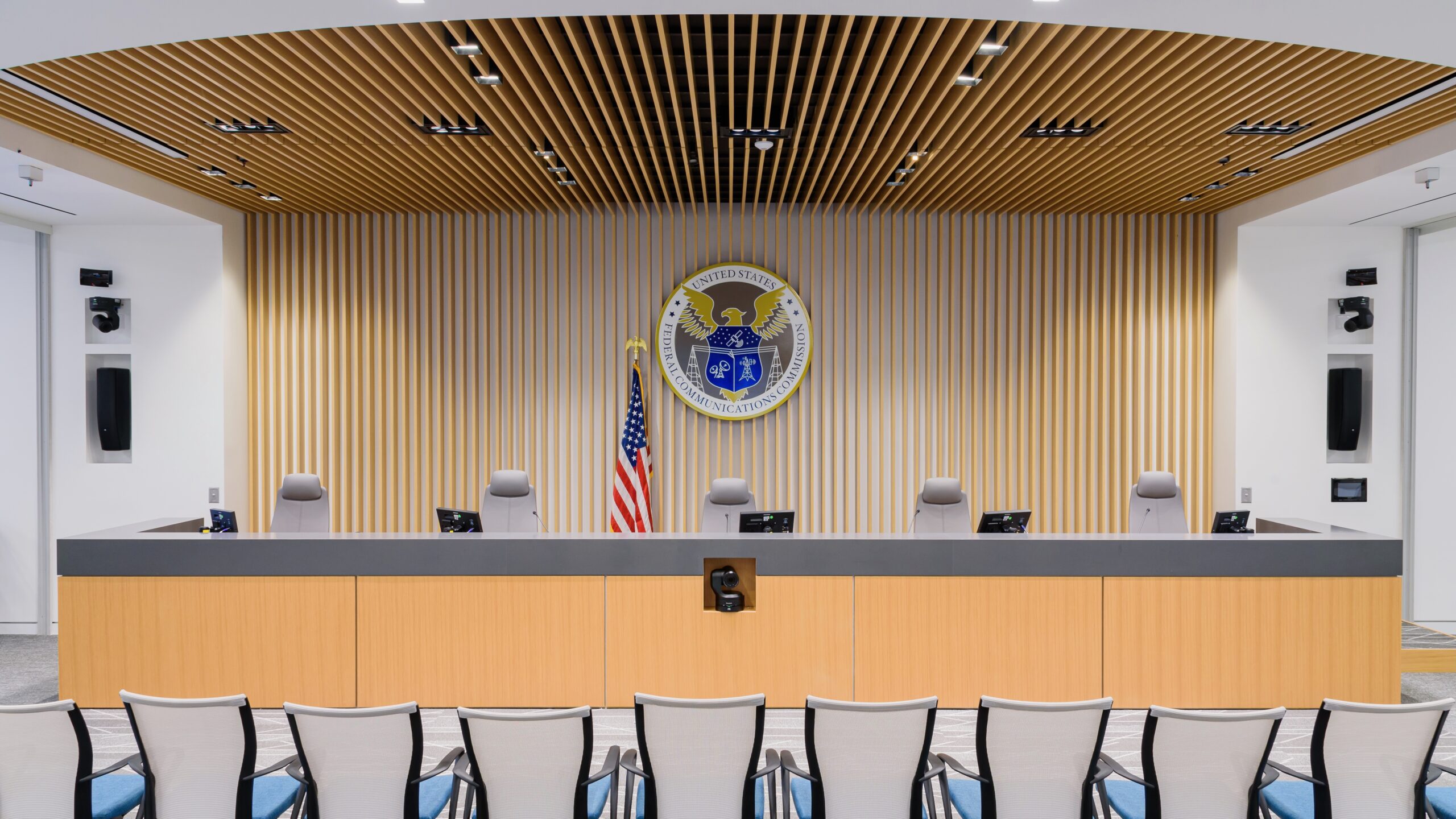FCC denies former staffers’ nonrenewal request for KPTS, Wichita
The FCC decided in July 1999 that it did not have grounds to get involved in an extended staff-management conflict at public TV station KPTS in Wichita/Hutchinson, Kan., but it fined the station $5,000 for not reporting two staffers’ gender discrimination complaints.
Before the
Federal Communications Commission
Washington, D.C. 20554
In re Application of )
)
Kansas Public Telecommunications Services, Inc.) File No. BRET-980129KG
)
For Renewal of License for )
Station KPTS(TV) )
Hutchinson, Kansas )
MEMORANDUM OPINION AND ORDER AND NOTICE OF APPARENT LIABILITY
Adopted: July 28, 1999; Released: July 28, 1999
By the Chief, Mass Media Bureau:
I. INTRODUCTION
1. The Commission, by the Chief, Mass Media Bureau, pursuant to delegated authority, has
before it for consideration: (i) the license renewal application of Kansas Public Telecommunications Services,
Inc. ("KPTS, Inc." or "licensee") for Station KPTS(TV), Hutchinson, Kansas; (ii) an informal objection to
the renewal application filed by Candyce Hoop ("Hoop") and Som Chanthabouly ("Chanthabouly")
(collectively "informal objectors"), former employees of KPTS(TV); (iii) licensee's "Motion For Extension of
Time" to file its opposition; (iv) an opposition to the informal objection filed by the licensee; (v) one letter filed
by both informal objectors and another letter filed by Hoop in response to the licensee's opposition; (vi) an
amendment to the station's renewal application filed on August 18, 1998, by the licensee; (vii) a "Motion For
Leave to File an Additional Pleading" and a pleading titled "Motion to Dismiss" filed by the licensee; (viii) a
letter filed by the informal objectors in response to the licensee's two motions; and (ix) copies of the
discrimination complaints that the informal objectors filed with the U.S. District Court for the District of
Kansas.
II. BACKGROUND
2. The licensee filed its license renewal application and accompanying FCC Form 396 for
KPTS(TV) on January 29, 1998. Donald Checots ("Checots"), President and General Manager of KPTS, Inc.,
certified that the statements contained in the Form 396 were true and correct to the best of his knowledge,
information and belief. In Section VII of its Form 396, which states "[y]ou must provide here a brief
description of any complaint which has been filed before any body having competent jurisdiction under Federal,
State, territorial or local law, alleging unlawful discrimination in the employment practices of the station
including the persons involved, the date of filing, the court or agency, the file number (if any), and the
disposition or current status of the matter," the licensee stated "No Complaints."
3. In an informal objection filed April 30, 1998, Hoop and Chanthabouly allege that KPTS "has
violated the public trust through the actions detailed in these documents and should not be renewed." The
referenced documents were three employment discrimination complaints attached to the informal objection.
They were filed by Hoop, Chanthabouly and Nikita Williams, another former employee of Station KPTS(TV),
against KPTS, Inc., several individuals, including Checots, as well as all members of the KPTS Board of
Trustees. In the complaints, the licensee was accused of various things, including defamation, gender
discrimination, and retaliatory discharge. We note that only Hoop and Chanthabouly alleged gender
discrimination. The dates stamped on the three discrimination complaints indicate that they were received by
the Kansas Human Rights Commission (KHRC) on December 29, 1997.
4. In its July 10, 1998, opposition, the licensee argued that, because it is the Commission's policy
to take cognizance of only a final determination of an employment discrimination complaint and because there
is no evidence that the licensee violated any Commission rule or policy, the Commission should deny the
informal objection and grant KPTS(TV)'s renewal application expeditiously. The licensee also explained its
failure to report the discrimination complaints in its Form 396. It stated that it prepared its license renewal
materials in early January 1998. The licensee then forwarded them to communications counsel and the station's
renewal application was filed with the Commission on January 29, 1998. The licensee contended that it became
aware of the complaints in the interim (between preparation of the renewal materials and filing of the renewal
application) through a reporter's phone call and received copies of the complaints about a week after the call.
The licensee claimed that it inadvertently failed to report the complaints because the materials involved "simply
crossed in the mail." Attached to the opposition was a sworn declaration from Checots in which he stated that
the facts set forth in the opposition were "true and correct to the best of his knowledge and belief."
5. In a letter dated July 29, 1998, the informal objectors described the licensee's statements
concerning its failure to report the complaints, which were confirmed or sworn to by Checots, as "patently false
and misleading." They stated that the KHRC has advised them that it had mailed copies of the complaints to
the station, as well as to all named respondents, on December 31, 1997. In addition, the informal objectors
attached a copy of a January 6, 1998, article in the Wichita Eagle in which Checots is quoted concerning his
reaction to the complaints. Further, Hoop filed a letter, dated July 29, 1998, stating that "we [the informal
objectors] have discovered that Mr. Don Checots, in a staff meeting held at KPTS on Tuesday, January 6,
1998, referred to the Wichita Eagle article and acknowledged that the station and all individual respondents
had previously been served with our complaints."
6. On August 18, 1998, the licensee filed an amendment to its renewal application. In this
amendment, the licensee reported the discrimination complaints filed by Hoop, Chanthabouly and Williams in
Section VII of Form 396.
7. On December 30, 1998, the licensee filed a "Motion For Leave to File an Additional Pleading"
and a pleading titled "Motion to Dismiss." In the former, the licensee requested that the Commission accept
its Motion to Dismiss because "[f]undamental fairness weighs in favor" of doing so given that the mandate in
the Lutheran Church case, which held that the Equal Employment Opportunity ("EEO") program requirements
of the EEO Rule were unconstitutional, has issued. In its pleading titled Motion to Dismiss, the licensee
requested that the Commission dismiss the informal objection and grant KPTS(TV)'s renewal application. It
argued that, even if the informal objection could be read as alleging violations of the EEO Rule, its EEO
program requirements had been declared unconstitutional and it is the policy of the Commission to forward
individual discrimination complaints alleging a violation of the remaining section of the EEO Rule, the anti-
discrimination provision, to the Equal Employment Opportunity Commission ("EEOC"). The licensee also
provided a more detailed explanation for its failure to report the complaints on its Form 396. The licensee
stated that it knew about the complaints by January 6, 1998, when Checots disclosed their existence at a staff
meeting. The licensee contended that the station's renewal application did not report the complaints because
preparation of the renewal materials pre-dated the station's receipt of the complaints and the station
"inadvertently failed to amend its renewal materials due to the confusion and press of business surrounding the
complaints." Further, the licensee argued that its amendment to the renewal application, in which it reported
the complaints, moots the issue about when the licensee learned of the complaints.
8. In a January 13, 1999, response to the licensee's motions, the informal objectors argued that
the licensee clearly misled the Commission by failing to report the filing of their discrimination complaints.
They also stated that the KHRC had determined that probable cause exists to credit the allegations contained
in their complaints and that they are in the process of requesting, from the EEOC, "right to sue" letters to take
this matter to federal court. On May 18, 1999, the informal objectors submitted copies of the complaints that
they had filed with the U.S. District Court for the District of Kansas. These complaints included copies of
letters from KHRC to the informal objectors informing them that KHRC has found that probable cause exists
to credit the allegations in their complaints and "Right to Sue Notices" from the EEOC.
III. DISCUSSION
9. Discrimination Complaints. We will grant the licensee's "Motion For Leave to file an
Additional Pleading" because we believe that the additional pleading in question, titled "Motion to Dismiss,"
provides information essential to our analysis of a key issue in this case. See 47 C.F.R. 1.45(c). Upon
review of the latter pleading, we conclude that it is appropriate to treat it as two separate pleadings, a Motion
to Dismiss, in which the licensee made arguments in support of dismissing the informal objection, and a
Supplement to Opposition, in which the licensee provided additional information concerning the licensee's
failure to report the discrimination complaints. As discussed infra, regardless of the Motion to Dismiss, we
are denying the informal objection and granting the station's renewal application. Therefore, this Motion is
dismissed as moot. We believe, however, that the Supplement to the Opposition, as well as other unauthorized
or late-file submissions in this proceeding, should be considered because information contained therein is
essential to forming a complete and clear record of the facts in this case.
10. Hoop and Chanthabouly alleged in their informal objection that KPTS "has violated the public
trust through the actions detailed in these documents [the three discrimination complaints] and should not be
renewed." In Lutheran Church, the Court of Appeals for the District of Columbia Circuit held that the EEO
program requirements set forth in Section 73.2080 of the Commission Rules, 47 C.F.R. 73.2080, are
unconstitutional under the Equal Protection Clause of the Fifth Amendment. The court's mandate has issued.
Therefore, we are now precluded from reviewing the licensee's EEO program for compliance with the EEO
program requirements.
11. Regarding the informal objectors' allegations of discrimination against KPTS(TV), the
allegations listed in the three complaints, except for gender discrimination, even if true, would not constitute
a violation of our broadcast non-discrimination provision because that provision does not encompass
discrimination based on any of these factors. Although Hoop and Chanthabouly's allegations of gender
discrimination would fall within the scope of the FCC's non-discrimination provision, their discrimination
complaints are still pending in court and it is the Commission's longstanding general policy to defer action on
individual complaints of discrimination in the first instance. Consistent with this policy, we will defer action
on Hoop's and Chanthabouly's allegations pending a final determination by the court regarding employment
discrimination. We will expect the licensee to periodically update the Commission on the status of the pending
complaints filed by Hoop and Chanthabouly.
12. Section 73.1015 Violation. We are, however, troubled by the licensee's initial failure to report
the discrimination complaints in its Form 396. We find no evidence of an intent to deceive that would support
a finding of misrepresentation or lack of candor. Evidence of an intent to deceive is necessary to support such
a finding. Swan Creek Communications v. FCC, 39 F.3d 1217, 1222 (D.C. Cir. 1994); Fox Television
Stations, Inc., 10 FCC Rcd 8452, 8487 (1995); Fox River Broadcasting, Inc., 93 FCC 2d 127, 129 (1983).
In this regard, we are unable to discern any motive for the licensee to conceal the pending discrimination
complaints. The pending discrimination complaints would not, by themselves, delay grant of the licensee's
renewal application because, as noted above, the Commission's general policy is to defer action on individual
discrimination complaints until acted upon by a government agency and/or court established to enforce non-
discrimination laws. In addition, contrary to the arguments made by the informal objectors, we do not find that
the licensee's statements concerning this matter have been false or misleading. Nonetheless, we believe that
the licensee's factual omissions cannot be ignored. Full and clear disclosure of all material facts is essential
to the efficient administration of the Commission's license renewal process. Proper analysis of a licensee's
renewal application is critically dependent upon the accuracy and completeness of information and data which
only the licensee can provide. Section 73.1015 of the Commission's Rules, 47 C.F.R. 73.1015, states in
pertinent part that "No applicant ... shall ... in any application, pleading, or report or any other written
statement submitted to the Commission, make any ... willful material omission bearing on any matter within
the jurisdiction of the Commission." A "willful material omission" need not be accompanied by an intent to
deceive. It is sufficient that the omission be conscious and deliberate, irrespective of intent. Abacus
Broadcasting Corp., 8 FCC Rcd 5110, 5115 (Rev. Bd. 1993) (Abacus Broadcasting).
13. We find that the licensee's Form 396 omitted material facts, as described above. Further, we
find that this action was willful inasmuch as Checots certified that the information contained in the Form 396,
including the "No Complaints" response in Section VII, was true and correct to the best of his knowledge,
information and belief. It is undisputed that Checots was aware of the pending discrimination complaints when
the station's renewal application was filed. The licensee states that Checots discussed the complaints in a staff
meeting on January 6, 1998, and, therefore, had at least three weeks, from the time he knew of the complaints
until the time the station's renewal application was filed (January 29, 1998), to revise the station's renewal
application to reflect the existence of the complaints. His failure to do so reflects an apparent lack of concern
for the accuracy of information provided to the Commission. The amendment of the renewal application over
six months after originally filed and only after an informal objection has been filed alerting the Commission
to the existence of the complaints, rather than mooting this issue as argued by the licensee, further supports
this conclusion.
14. Accordingly, we conclude that the informal objection fails to raise a substantial and material
question of fact warranting further inquiry; that the informal objection should be denied; and that grant of the
renewal application for KPTS(TV) is in the public interest, pursuant to 309(k) of the Communications Act,
as amended, 47 U.S.C. 309(k). However, we find that a forfeiture should be assessed against the licensee
of KPTS(TV) for willfully omitting material facts in its Form 396 in violation of Section 73.1015 of the
Commission's Rules. In The Commission's Forfeiture Policy Statement and Amendment of Section 1.80 of the
Rules to Incorporate the Forfeiture Guidelines, 12 FCC Rcd 17087 (1997), the Commission adopted guidelines
for assessing forfeitures. However, these guidelines do not enumerate a base forfeiture amount for a willful
material omission. Under these circumstances, the forfeiture must be assessed taking into account the relevant
statutory factors in Section 503(b)(2) of the Communications Act of 1934, including "the nature,
circumstances, extent, and gravity of the violation and, with respect to the violator, the degree of culpability,
any history of prior offenses, ability to pay, and such other matters as justice may require." Based on our
assessment of these factors, we conclude that the licensee's violation of Section 73.1015 warrants issuance of
a Notice of Apparent Liability for a forfeiture in the amount of $5,000. See Application of WRKL Rockland
Radio, L.L.C., 14 FCC Rcd 1042 (MMB 1999) ($5,000 Notice of Apparent Liability imposed on licensee for
willfully omitting the existence of employment discrimination complaints filed against its station in that station's
Form 396, in violation of Section 73.1015). Cf. Abacus Broadcasting.
IV. ORDERING CLAUSES
15. ACCORDINGLY, IT IS ORDERED that the informal objection filed by Hoop and
Chanthabouly concerning the license renewal application for Station KPTS(TV) IS DENIED.
16. IT IS FURTHER ORDERED that the licensee's "Motion For Leave to File an Additional
Pleading" IS GRANTED and its Motion to Dismiss IS DISMISSED AS MOOT.
17. IT IS FURTHER ORDERED that, pursuant to Section 503 of the Communications Act of
1934, as amended, 47 U.S.C. 503, the license renewal application filed by Kansas Public
Telecommunications Service, Inc. for Station KPTS(TV) IS GRANTED subject to a NOTICE OF
APPARENT LIABILITY FOR FORFEITURE in the amount of $5,000.
18. IT IS FURTHER ORDERED that the licensee of KPTS(TV) update the Commission on
any change in the status of the pending discrimination complaints filed by Hoop and Chanthabouly within 30
days of such a change.
19. IT IS FURTHER ORDERED that copies of this Memorandum Opinion and Order and
Notice of Apparent Liability be sent by Certified Mail -- Return Receipt Requested -- to Candyce Hoop, Som
Chanthabouly and Kansas Public Telecommunications Service, Inc.
20. Regarding the forfeiture proceeding, the licensee of Station KPTS(TV) may take any of the
actions set forth in Section 1.80 of the Commission's Rules, 47 C.F.R. 1.80, as summarized in the attachment
to this Order. Any comments concerning ability to pay should include those financial items set forth in the
attachment.
21. This action is taken under delegated authority pursuant to Section 0.283 of the Commission's
Rules, 47 C.F.R. 0.283.
FEDERAL COMMUNICATIONS COMMISSION
Roy J. Stewart
Chief, Mass Media Bureau
Comments that do not follow our commenting policy will be removed.





